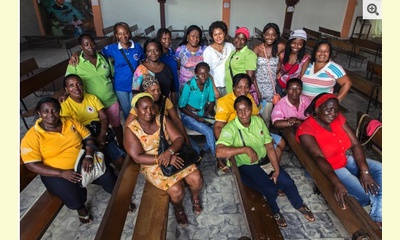|
|
Colombian women's rights group wins top UNHCR award for work with war victims
un articulo por Anastasia Moloney, Thomson Reuters Foundation
They have received death threats, been forced from their homes,
and live in the middle of drug turf wars, but nothing has stopped a
Colombian women’s rights group that is this year’s recipient of a
U.N. refugee agency award. 
Members of the Butterflies women's rights network in the Colombian city of Buenaventura, who are the 2014 Nansen Refugee Award winners Credit: UNHCR
click on photo to enlarge
Living in Buenaventura, Colombia’s main port city along its Pacific
coast, the group’s network of 120 volunteers - Butterflies with New
Wings Building a Future – has been awarded the UNHCR’s
annual Nansen Refugee Award, for their work in helping 1,000
women who have suffered at the hands of warring factions in
Colombia’s 50-year war.
“Women who have been forcibly displaced and whose husbands and
children have been killed or have disappeared are left unprotected.
We help them, and those who’ve suffered sexual violence, to rebuild
their lives and heal their trauma,” said Mery Medina, one of three
women from the Butterflies who will receive the award on behalf of
the group in Geneva later this month.
“We’re fighting the indifference among communities and the state
about violence against women,” she told the Thomson Reuters
Foundation as she walked along a waterfront slum in Buenaventura.
Fighting such indifference is dangerous work in a city where armed
gangs linked to former paramilitary groups are imposing a reign of
terror on entire neighborhoods as they fight for control of drug-
smuggling routes, extortion rackets and the illegal gold mines
nestled in mountainous rainforest surrounding Buenaventura.
“There’s fear in the city,” said priest Jhon Reina, head of pastoral
work at the diocese of Buenaventura. “The fear comes from
showcase killings carried out by armed groups. Several women have
told me they’ve heard the screams of people as they are cut up alive
in chop-up houses. The dismembered body parts have appeared in
the streets and sea.”
Women and girls living in the city’s impoverished neighborhoods
are particular targets.
“Armed groups are using women’s bodies to demonstrate their
power and strength. They also seek revenge by raping or killing the
girlfriend of a rival gang member,” said Gloria Amparo, a veteran
women’s rights activist, who helped create the Butterflies network
in 2010.
Such violence and fear have forced more than 50,000 people to flee
from their homes in Buenaventura alone in the past three years,
according to official figures.
With 5.7 million people uprooted across the country, Colombia is
second only to Syria in the number of internally displaced people,
the UNHCR says.
Armed groups in Buenaventura are known to control many aspects
of life in ways that are not visible at first glance.
Most residents - from street vendors to big businessmen - have to
pay criminal gangs an illegal tax, known locally as a vaccine or
vacuna. The city’s “invisible borders” that divide gang territory, and
unofficial curfews at sunset, dictate when and where people can
walk safely.
“I’ve many invisible borders that I can’t cross,” said Amparo. “I’ve
had to ask permission from armed groups to enter certain
neighborhoods. When they tell me not to enter, I don’t go in.”
Despite this, the Butterflies network has become a driving force in
raising awareness about the high levels of violence against women
in this muggy city of 400,000.
(This article is continued in the discussionboard)
|








|
DISCUSSION
No hay pregunta ligada a este article.
* * * * *
Comentario más reciente:
(The following is continued from the main article listed above.)
They march the streets of Buenaventura clamouring “No more abuse of women,” organize vigils to mark the anniversary of the dead and missing, and hold sit-ins outside the prosecutor’s office to demand justice for crimes against women marked by almost total impunity.
Each event is a small but significant symbol of defiance as it attracts the attention of armed groups and puts the Butterflies network in the firing line.
“These women are doing extraordinary work in the most challenging of contexts,” U.N. High Commissioner for Refugees Antonio Guterres said in a statement. “Each day they seek to heal the wounds of the women and children of Buenaventura and in doing so put their own lives at risk.”
The Butterflies also help women report crimes of sexual or domestic abuse to the police and judicial authorities.
“One way of protesting is not to keep our mouths shut,” Medina said. “We go with women and help them every step of the way so they can report crimes to officials. A few years ago no one reported any crimes. We hid in fear. But now we’re gradually speaking out.”
They also raise awareness among women about the rights of Afro-Colombian communities as enshrined in the country’s constitution, and existing laws that protect women.
The Butterflies plan to use the $100,000 UNHCR award to build Buenaventura’s first refuge for abused women and ensure more women learn about their rights.
“When a woman knows her rights and what the responsibilities of the state are, it allows her to have choices and make decisions. Knowing your rights, you can better defend yourself and your community,” Amparo said.. . ... continuación.

|
|









